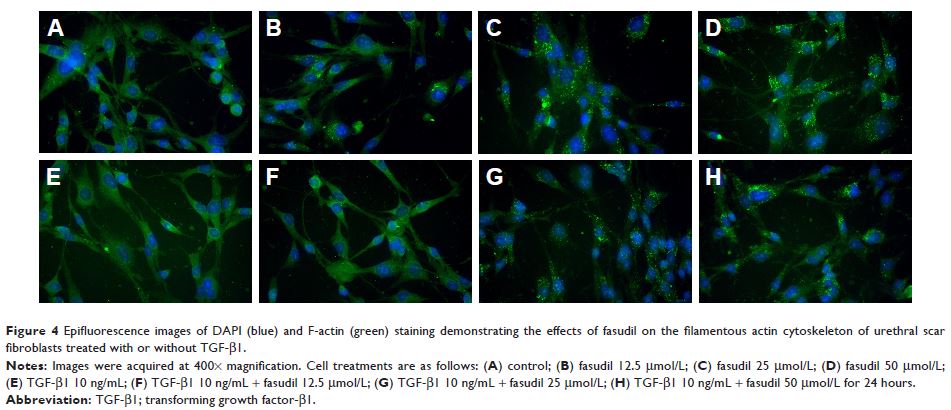108605
论文已发表
注册即可获取德孚的最新动态
IF 收录期刊
- 3.4 Breast Cancer (Dove Med Press)
- 3.2 Clin Epidemiol
- 2.6 Cancer Manag Res
- 2.9 Infect Drug Resist
- 3.7 Clin Interv Aging
- 5.1 Drug Des Dev Ther
- 3.1 Int J Chronic Obstr
- 6.6 Int J Nanomed
- 2.6 Int J Women's Health
- 2.9 Neuropsych Dis Treat
- 2.8 OncoTargets Ther
- 2.0 Patient Prefer Adher
- 2.2 Ther Clin Risk Manag
- 2.5 J Pain Res
- 3.0 Diabet Metab Synd Ob
- 3.2 Psychol Res Behav Ma
- 3.4 Nat Sci Sleep
- 1.8 Pharmgenomics Pers Med
- 2.0 Risk Manag Healthc Policy
- 4.1 J Inflamm Res
- 2.0 Int J Gen Med
- 3.4 J Hepatocell Carcinoma
- 3.0 J Asthma Allergy
- 2.2 Clin Cosmet Investig Dermatol
- 2.4 J Multidiscip Healthc

法舒地尔通过 Rho/ROCK 通路抑制肌动蛋白聚合和胶原合成并诱导人尿道瘢痕成纤维细胞的凋亡
Authors Li XD, Wu YP, Chen SH, Liang YC, Lin TT, Lin T, Wei Y, Xue XY, Zheng QS, Xu N
Received 4 November 2017
Accepted for publication 2 July 2018
Published 3 September 2018 Volume 2018:12 Pages 2707—2713
DOI https://doi.org/10.2147/DDDT.S156095
Checked for plagiarism Yes
Review by Single-blind
Peer reviewers approved by Dr Palas Chanda
Peer reviewer comments 3
Editor who approved publication: Professor Manfred Ogris
Purpose: To examine the effects and mechanism of action of fasudil on cytoskeletal polymerization, collagen synthesis, and apoptosis in fibroblasts derived from human urethral scar tissue.
Materials and methods: Fibroblasts treated with or without transforming growth factor β1 (TGF-β1, 10 ng/mL) were incubated with fasudil (12.5, 25, 50 µmol/L) for 24 hours. Quantitative real-time polymerase chain reaction and Western blotting were used to determine the expression of Arp2, Arp3, WASP, and WAVE2. Collagen I and III protein levels were also evaluated by Western blotting. The filamentous actin cytoskeleton was examined by immunofluorescence and epifluorescence microscopy. An Annexin V-FITC/PI staining assay was used to investigate apoptosis.
Results: TGF-β1-dependent induction of actin polymerization and collagen synthesis and promotion of apoptosis were dose dependent. When compared with untreated controls, fasudil significantly decreased the expression of Arp2, Arp3, WASP, WAVE2, Collagen I, and Collagen III in cells treated with or without TGF-β1. Fasudil also promoted apoptosis in cells, irrespective of TGF-β1 treatment.
Conclusion: Irrespective of TGF-β1 activation status, fasudil suppressed actin polymerization and collagen synthesis and induced apoptosis in human urethral scar fibroblasts via the Rho/ROCK signaling pathway.
Keywords: fasudil, polymerization, cytoskeleton, Rho/ROCK
Purpose: To examine the effects and mechanism of action of fasudil on cytoskeletal polymerization, collagen synthesis, and apoptosis in fibroblasts derived from human urethral scar tissue.
Materials and methods: Fibroblasts treated with or without transforming growth factor β1 (TGF-β1, 10 ng/mL) were incubated with fasudil (12.5, 25, 50 µmol/L) for 24 hours. Quantitative real-time polymerase chain reaction and Western blotting were used to determine the expression of Arp2, Arp3, WASP, and WAVE2. Collagen I and III protein levels were also evaluated by Western blotting. The filamentous actin cytoskeleton was examined by immunofluorescence and epifluorescence microscopy. An Annexin V-FITC/PI staining assay was used to investigate apoptosis.
Results: TGF-β1-dependent induction of actin polymerization and collagen synthesis and promotion of apoptosis were dose dependent. When compared with untreated controls, fasudil significantly decreased the expression of Arp2, Arp3, WASP, WAVE2, Collagen I, and Collagen III in cells treated with or without TGF-β1. Fasudil also promoted apoptosis in cells, irrespective of TGF-β1 treatment.
Conclusion: Irrespective of TGF-β1 activation status, fasudil suppressed actin polymerization and collagen synthesis and induced apoptosis in human urethral scar fibroblasts via the Rho/ROCK signaling pathway.
Keywords: fasudil, polymerization, cytoskeleton, Rho/ROCK
